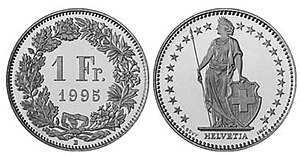 Image via WikipediaBy Stephen Kirkland
Image via WikipediaBy Stephen Kirkland Stocks fell worldwide to a three- month low, the euro weakened and European government default risk climbed to a record on concern the region’s debt crisis is worsening. The Swiss franc and oil gained, while copper dropped.
The MSCI All-Country World Index slid 1.2 percent at 7:25 a.m. in New York. Standard & Poor’s 500 Index futures lost 0.2 percent after the benchmark U.S. equity gauge tumbled 1.7 percent yesterday. The euro depreciated 0.5 percent to $1.4107. The Greek two-year note yield rose to more than 30 percent. The Markit iTraxx SovX Western Europe Index of swaps on 15 governments jumped 14 basis points to 240. Oil advanced 0.6 percent, while copper declined 1.2 percent.
Greek Prime Minister George Papandreou is seeking to win a confidence vote as violence erupted over budget cuts and austerity measures needed for international aid. Irish Finance Minister Michael Noonan said yesterday senior bondholders should share in the losses of Anglo Irish Bank Corp. and Irish Nationwide Building Society, reversing a policy of protecting owners of senior securities.
“The risk of the Greek crisis spiraling out of control has increased markedly,” Kit Juckes, head of currency strategy at Societe Generale SA in London, wrote in a report. “Failure of the emergency Eurogroup to agree on anything was bad enough. Strike action yesterday was awful PR. The prime minister’s offer to resign on condition opposition parties agree to additional austerity measures provided a frightening note of panic.”
The Stoxx Europe 600 Index fell 1 percent as more than 20 shares dropped for every one that gained. Anglo American Plc led mining companies lower, retreating 2.9 percent. The benchmark gauge for European equities is heading for a seventh straight week of losses, the longest losing streak since January 2008.
Earnings Yield
The decline has cut the index’s valuation to 12.2 times its companies’ reported earnings, the lowest since 2008. The Stoxx 600 pays investors 8.2 percent of their money back in earnings, compared with a yield of 2.92 percent on benchmark German 10- year bunds, according to data compiled by Bloomberg.
The extra yield investors demand to hold Greek 10-year bonds instead of bunds rose to 1,500 basis points, an all-time high, while the Portuguese-German spread widened to a euro-era record. Irish two-year note yields jumped 31 basis points. Spanish 10-year yields climbed 17 basis points as the government sold 2.8 billion euros of eight- and 15-year bonds, below the maximum 3.5 billion-euro target.
Default Risk
Credit swaps on Greece rose 129 basis points to an all-time high of 1,899, signaling a 79 percent chance of default, while Ireland was up 50 at 816 and Portugal climbed 40 to 837. Irish senior bank bonds declined, with Anglo Irish’s 1.25 billion euros of senior unsecured floating-rate notes due January diving 13 cents on the euro to 70 cents, according to Jefferies International Ltd.
The premium European banks pay to borrow in dollars through the swaps market jumped to the most since March. The rate that London-based banks say they charge each other for overnight loans in euros rose for the first time in four days, with the London interbank offered rate, or Libor, increasing to 1.257 percent from 1.211 percent yesterday, according to the British Bankers’ Association.
The euro declined for the second day versus the dollar, with one-month implied volatility on options for the euro-dollar rate climbing to the highest since December. The 17-nation currency slipped 0.9 percent against the yen.
Swiss Rates
The franc strengthened to a record 1.19567 against the euro, appreciating to less than 1.20 for the first time, even as the Swiss National Bank kept its benchmark interest rate at 0.25 percent, an outcome predicted in a survey of economists by Bloomberg, and signaled concern about the currency’s ascent. The yen climbed 0.3 percent versus the dollar, rising against all 16 major peers.
U.S. index futures were little changed after the S&P 500 dropped yesterday to a three-month low. A report at 8:30 a.m. in Washington today may show U.S. housing starts increased 4.2 percent in May from the prior month, according to the median estimate of 78 economists surveyed by Bloomberg. Other data may show initial jobless claims declined and manufacturing in the Philadelphia region grew at a faster pace.
The MSCI Emerging Markets Index fell 1.7 percent, the most in three weeks. The Shanghai Composite Index slid 1.5 percent after the Economic Information Daily said in an editorial that an interest-rate increase in China isn’t “far away.”
The Bombay Stock Exchange Sensitive Index slipped 0.8 percent as India’s central bank raised borrowing costs for the 10th time since the start of 2010. Hungary’s forint weakened 1 percent against the euro after the International Monetary Fund said the government may breach the European Union’s budget- deficit limit next year.
Oil rose 62 cents to $95.43 a barrel in New York, after losing $4.56 yesterday. Cocoa fell 1.9 percent and cotton dropped 2.2 percent.
source: bloomberg.com
 4:45 AM
4:45 AM
 admin
admin


 Posted in:
Posted in: 

0 comments:
Post a Comment